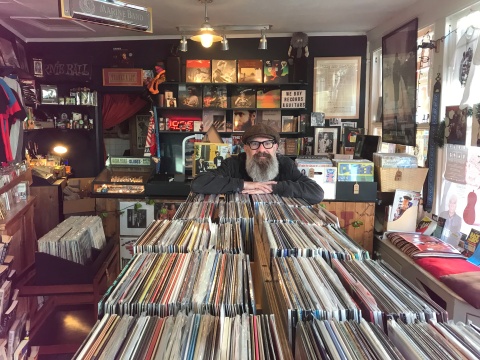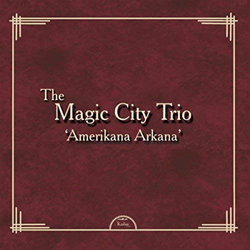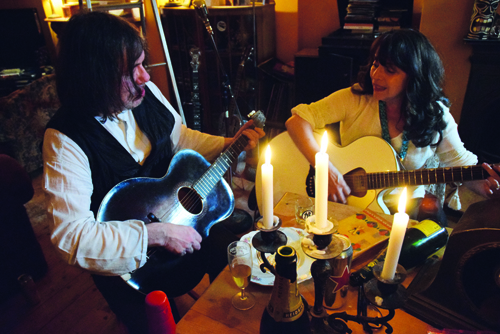
Say It With Garage Flowers talks Tarantino, vintage Italian film soundtracks, rare vinyl and ’70s funk and soul-jazz with hip US recording collective Whatitdo Archive Group. Nice!
To describe an album as “the soundtrack to a film that doesn’t exist” has become a music journalism cliché, but in the case of The Black Stone Affair by Whatitdo Archive Group it’s perfectly true.
For their latest record, the US recording collective (Aaron Chiazza, drums/percussion; Mark Sexton (electric guitar, percussion); Christopher Sexton (Hammond B3 organ, Rhodes, Mellotron, harpsichord) and Alexander Korostinsky (bass, electric guitar, mandolin, percussion), who are based in Reno, Nevada, wanted to create an album that encompassed everything they love and admire about old Italian film soundtracks and scores and bring that energy back into the spotlight.
They’ve certainly achieved it, as The Black Stone Affair is dramatic, atmospheric, exotic – even erotic at times – and very, very authentic sounding.
As well as musicians and recording engineers, the members of Whatitdo Archive Group are voracious vinyl collectors. They spent nine months of research, digging through their records and studying the works of composers including the legendary Ennio Morricone, as well as Piero Piccioni, Stefano Torossi, François de Roubaix and Alessandro Alessandroni, before composing this imaginary cinematic soundtrack and working with over 24 other musicians – there are some superb orchestral and brass arrangements on the album.
‘The Black Stone Affair is dramatic, atmospheric, exotic – even erotic at times – and very, very authentic sounding’
In an exclusive interview, Say It Garage Flowers spoke to this bunch of dedicated crate-diggers and cult film soundtrack specialists to find out the story behind their latest project.
Q&A
Can you tell us about the origins of Whatitdo Archive Group? How did the collective come together?
Mark Sexton: We all got together in our college years. Alex and I were looking for a fill-in drummer for a gig, and reached out to Aaron Chiazza – we hit it off right away. There was a chemistry – not just musically, but in how we all got along.
We ultimately decided to create a side-project together, which we would use as a “musical outlet” to break free from the straightforward music we were playing in our other bands. That was the concept – a band where you can do whatever you want, and bending the rules is encouraged. From these early days as an avant-garde funk band, our tastes grew together, along with our musicianship.
In the beginning, we wanted to be like a strange version of The Meters – we idolised funk and soul-jazz music of the ‘70s. We would often incorporate the strangest chord progressions and time signatures into our playing, just because we could.
Once we got our jitters out, we shifted gears into a more mature sound, inspired by the groovy compositions of Italian soundtracks, library and soul-jazz recordings of the 1960s and 1970s.
You’re all big record collectors. How big are your record collections and what are some of your coolest, rarest or favourite records you own?
Aaron Chiazza: I can speak for all of us and say that our collections are big enough to be a pain in the ass when moving to a new home. Some of my favourites are Isao Tomita – Snowflakes Are Dancing; Coleman Hawkins – At Ease With Coleman Hawkins and Wings – Wings At The Speed Of Sound.
Alexander Korostinsky: My collection is about 600 deep right now. It’s all seriously curated stuff. I’m not the type of collector that just buys anything willy-nilly, I’ve spent over 10 years crate-digging and they’re all special to me.
In my opinion, some of the coolest records that I have are Indonesian and Thai funk and soul records. The rarest that I have are probably my library records and possibly my first pressing of D’Angelo‘s Voodoo. I’m on the lookout for all of the obscure and exotic Italian soundtracks and library records that there seem to be an endless supply of.
‘We wanted to be like a strange version of The Meters – we idolised funk and soul-jazz music of the ‘70s. We would often incorporate the strangest chord progressions and time signatures into our playing, just because we could’
MS: All of our collections are slightly different. Alex’s is heavy on soundtracks, library and exotica. Aaron’s has lots of ‘80s funk, and rock & roll oddities. My collection is full of Brazilian samba, disco and R&B 45s. My most prized record is actually one my wife found at a yard sale –an original mono pressing of Aretha Franklin’s Lady Soul. I’m always on the lookout for new gems.
Do you have any favourite record shops?
MS: Groove Merchant in San Francisco is an amazingly well-curated shop for jazz, funk, and soul. Also, let’s get real… Discogs is very useful.
AK: Groove Merchant in San Francisco is definitely one of the coolest stores in the US, but during tours across Europe, playing music, we also got to see some very, very interesting record stores in Germany, France, Netherlands and Switzerland. The record store, 16 Tons, in Zürich is definitely one of my all-time favourites by far. It doubles as a mid-century modern furniture store, which really captured my heart.
What’s your preferred way of listening to music? Are you audio obsessives?
AC: Being a mixing engineer, you gain insight listening through poor gear and nice gear. When I’m listening through nice speakers, I always try to position my head where it sounds best.
MS: We all have great vinyl systems at home – I wish we could listen to that quality everywhere. I’m usually listening to Spotify on the go in my car, or through some decent headphones, but at home, it’s vinyl 90 per cent of the time.
 Let’s talk about The Black Stone Affair album. How did the idea for the soundtrack come about? What was the inspiration and the starting point for the project?
Let’s talk about The Black Stone Affair album. How did the idea for the soundtrack come about? What was the inspiration and the starting point for the project?
AC: I think the idea truly came from our FOMO [fear of missing out] on smoke-filled, well-dressed studio sessions from a past era. That mixed with the cinematic era of ‘70s Italian funk pumping out amazing records.
As far as The Black Stone Affair goes, we knew that we loved albums from that time, so we decided to make our own to go along with a coinciding movie plot.
AK: Around late 2015, we had all just starting to really get into listening to older European music. It was pretty obvious from the get-go that we all started gravitating toward Italian cinematic scores. So at one point Mark brought Blood Chief [from The Black Stone Affair] to the table, and after we hashed that out, it kind of felt right to take everything we were doing in that direction. After we worked on that song, the rest of the music started to materialise, and before you knew it, we had an album’s worth of material.
The record is influenced by old Italian soundtrack scores. Can you tell us some of your favourite films / soundtracks and composers, and why you like them?
MS: It all started with us being fans of household names like Sergio Leone, Antonioni, Fellini and their collaborations with Ennio Morricone, Alessandro Alessandroni and Stelvio Cipriani, but you realise that is just the tip of the iceberg. These composers had such long careers making hundreds of scores. That’s a lot of music to listen to. It’s easy to fall in love with the exciting sounds of reverb-soaked baritone guitars, harpsichord melodies and lush string passages.
What kind of movie do you envisage The Black Stone Affair to be? From the music it feels part Spaghetti Western, part blaxploitation and part spy / adventure movie…
AK: Yeah, exactly. I’m glad you said that. That’s definitely the precise direction we were imagining this would be taking: a classic spaghetti/acid-western/spy-crime/blaxploitation type of giallo/adventure noir. That’s a mouthful!
‘It’s easy to fall in love with the exciting sounds of reverb-soaked baritone guitars, harpsichord melodies and lush string passages’
How did you write and score the tracks and what were the sessions like?
AC: The songs were written organically, either in a group setting or alone. We moved into scoring songs as needed, depending on instrumentation.
There was no block time that the album was recorded in. Some songs were from past sessions and some came closer to the final build-up of the process. Working like that takes a little longer, but it helps the album grow naturally. I think we accomplished that.
MS: Either Alex or myself brought most of the initial ideas to the table as demos. We would then work out arrangements and finalise the songs in rehearsal before hitting record. However, a lot of the time the songs would go straight to tracking without us ever playing the songs in a room together. Some of the songs evolved because we played them live and the live versions gave us ideas for the record.
‘The majority of the album was recorded in Alex’s home studio using tube preamps and ribbon microphones into his DAW (Digital Audio Workstation)’
You worked with 24 musicians and recorded the album in Alexander’s home studio. How was that?
MS: We had a great time recording the album and pulled in a lot of favours from many of our musician friends, and even a Hail Mary contacting Alessandro Alessandroni Jr. for him to do the whistle part on The Return Of Beaumont Jenkins.
The majority of the album was recorded in Alex‘s home studio using tube preamps and ribbon microphones into his DAW (Digital Audio Workstation). The song Farewell Lola was recorded on a 1970s TEAC 1/4” tape machine and the non-album bonus track, La Pietra, was done on his Tascam 388.
Let’s talk about some of the tracks on the album. What can you tell me about them? The Black Stone Affair (Main Theme) is dark and moody, with psych guitars and a Morricone / John Barry feel. There’s harpsichord and organ, and then it gets all funky….
AK: I really admired the arrangement of Piero Piccioni’s Colpo Rovente soundtrack. I wanted to capture that swirling bassline vibe with this song and give it the ultimate David Axelrod treatment.
The angular harpsichord melody was definitely a nod to Alessandroni and Morricone’s work in the mid ‘70s. My concept for the song was to have a very engaging opening track that covered a lot of melodic territory. There are three main motifs in the song: there’s the heartbeat rhythm in the beginning, the swirling bassline in the middle and then the psych-guitar freak-out at the end. All of which are musical motifs that are quoted later in the record.
‘We wanted to write our own anthem, like the Incredible Bongo Band’s Apache, but with a more Italian-western vibe’
Blood Chief is a more soulful number, with a cool groove and some great Rhodes piano on it….
Mark Sexton: This song was conceptualised in my old apartment in Truckee. In fact, the demo and guitar part were written on an iPhone in the GarageBand app. It’s pretty funny, because I’ve never composed a song that way.
We wanted to write our own anthem like the Incredible Bongo Band’s Apache, but with a more Italian-western vibe. This is a song that got more intense as we played it live. We liked the live version, so we re-recorded it for the album, adding the guitar solo you hear.
Italian Love Triangle has a groovy bossa feel. It’s Easy Listening for European hipsters isn’t it? It’s one of the lighter numbers on the record…
AK: Italian composers and European music in general during that time had a sort of love affair with Brazilian bossa nova and so it seemed like a very appropriate thing to include one of those European-goes-bossa songs for this record. The nonsense vocals are by far my favourite part.
Last Train to Budapest is a thrilling chase theme – it’s very haunting, with some spooky vocal sounds…
MS: The “chase scene” was a box we knew we needed to tick as we wrote the album, but we kept putting it off. I had come up with a few ideas, but nothing felt like “it”. Alex showed me his demo, and I loved it. One important thing with a chase scene is tension… And I think the awkwardly stiff bongos, pounding bass and incessant wah-wah guitar puts it right where it needs to be.
L’Amour au Centre de la Terre is a romantic interlude, with lush strings and French vocals…
AK: This was a case where the song was written about a year before the idea for the album really appeared. It was just a song I was working on that I wanted to have a lot of fun with, and it ended up being so dramatic and so spooky that we couldn’t help but include it on the record.
‘We’d love to score for a real film. 007 would be fine, if they sent us some of that explosive chewing gum’
The melodies are actually quoted in other songs as well, so there’s this common string that’s woven through the entire fabric of the record that is the melodic motifs embedded in this track specifically. Listen to the string parts throughout the record and you’ll see what I mean.
Beaumont’s Lament is very Morricone Spaghetti Western. Agreed?
AK: Agreed.
The Return of Beaumont Jenkins is very funky and edgy, and it has some great whistling on it…
MS: This was a fun one to write. I wanted to have a song that mimicked the gritty bassline you here in Bob James’ Nautilus, but was more Spaghetti Western. It was imperative for it to feel like the movie’s “big moment”, when the hero, whom you thought was dead, emerges and rides off into the sunset.
Would you like to score the soundtrack for a real film? What kind of thing would you like to do? Do you have any interest in composing a Bond film soundtrack? Maybe you could do the one after No Time To Die? I think the modern 007 scores could do with a bit of freshening up…
AC: We’d love to score for a real film. 007 would be fine, if they sent us some of that explosive chewing gum. If a film were made for the music, I imagine we’d all be pretty involved. Music before film is quite a reversal of the status quo and we’re into it.
‘Quentin Tarantino should create the actual Blackstone Affair movie. The soundtrack is good to go – hell, we might even write a few more tunes for it if he picks it up’
Would you like someone to make the film that could go with The Black Stone Affair soundtrack? Who would you choose to direct it?
MS: Tarantino, or anyone crazy enough to go full out on this acid-western.
AK: That’s the biggest no-brainer of them all. Quentin Tarantino should create the actual Blackstone Affair movie. The soundtrack is good to go – hell, we might even write a few more tunes for it if he picks it up.
AC: That would be ideal. Tarantino seems to be the consensus.
The Black Stone Affair by Whatitdo Archive Group is released on April 9 on Record Kicks.
https://whatitdoarchivegroup.bandcamp.com/album/the-black-stone-affair
https://recordkicks.bandcamp.com/merch






